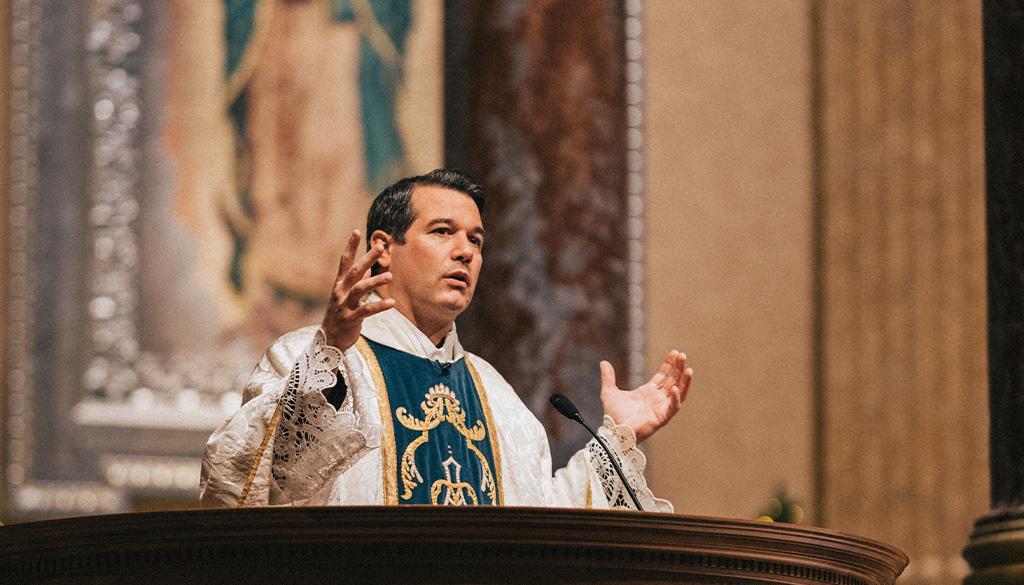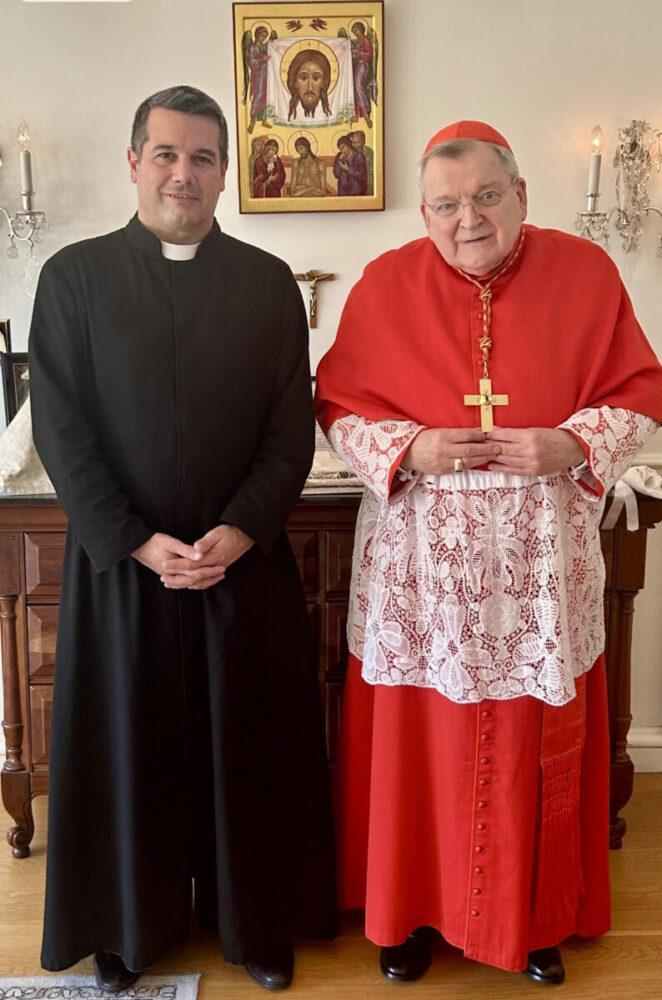Catholicism in the United States and the World: Interview with Argentine Priest/Theologian
The Argentine priest seeks to promote the faith as a counter-balance to progressivism and wokeism.

Fr. Javier Olivera Ravasi is a co-founder of the Order of Saint Elias and a native of Argentina. He offers a unique perspective, given that he now lives in the United States and has long had a career in the priesthood and academia in Argentina. He holds doctoral degrees in theology and history, as well as a law degree. In Argentina, he has taught courses in law and history. As part of his work in the Order of Saint Elias, he has focused on advancing what he calls a necessary cultural and spiritual counter-revolution to resist progressivism, materialism, and the LGBTQ agenda, among other challenges to the faith, by offering the beauty of the Faith. This work complements efforts by the Order to announce the Good News in places where the Faith has not penetrated previously or has long been dormant. Fr. Olivera Ravasi’s colleagues in the Order work in South America, Africa, and South Asia, sometimes covertly, to evangelize non-Christians and liberate Christians enslaved by Muslims.
He is active on social media, on his website QueNoTeLaCuenten (Don’t let them fool you), and on YouTube, where he offers a course dubbed Catechism for Barbarians.
Father Olivera Ravasi is currently working for Archbishop Salvatore Cordileone of San Francisco, and also ministers to Spanish-speaking pilgrims at the Shrine of Our Lady of Guadalupe in LaCrosse, Wisconsin, which was founded by Cardinal Raymond Burke. His latest book, The Cristero Counterrevolution and the Battle for the Soul of Mexico, was recently published by Os Justi Press.
You currently carry out your ministry in the United States. Is it true that Catholicism is growing here? What's happening?
Indeed, there is a notable increase in the number of Catholic faithful in the United States, and this is not by chance but is due, in my humble opinion, to the "law of the pendulum." That is, the modern world has shifted so far toward a progressive wokeism that many young people no longer view it as "original." It is part of the cultural and spiritual crisis that characterizes our times. Secularism and relativistic morality are no longer convincing in many places, so many young people are discovering or returning to the Catholic faith in search of a solid anchor. Several media outlets are highlighting this.
How is that? Has this also affected people "of the Church"?
Correct; fluid postmodernism has also affected some Catholics who believe that, rather than the Bride of Christ, the Church should be the bride of the moment, changing over time as the times change. Actually, the opposite is true: young people, already tired of change and searching for stability, are beginning to seek solid sustenance that will allow them to reach out to a God who never changes, as Saint Teresa of Avila would say. This terrain includes what they call the "traditional Mass" or the Latin Mass, which, Sunday after Sunday, in every diocese where it is celebrated, is packed with faithful, mainly young couples with many children.
Why did you come to the United States? You now serve as a priest in the Archdiocese of San Francisco and also serve as a chaplain at a shrine founded by Cardinal Raymond Burke.
I have known Cardinal Burke for several years, but we began to develop a more constant relationship after I interviewed him in 2022 for my YouTube channel, titled Que No Te Lo Cuenten, which has more than 500,000 viewers. On the channel, I seek to catechize viewers in what I characterize as a cultural and spiritual counter-revolution. Cardinal Burke is a man of God who, throughout his life, first as a priest, then as a bishop, and finally as a cardinal, has always given good witness to the Faith. It was he who, in October 2024, after consulting with the bishop of La Crosse and my ecclesiastical superiors of the Order of Saint Elias, appointed me chaplain for Hispanic pilgrims to the Shrine of Our Lady of Guadalupe in LaCrosse. It’s a strikingly beautiful place in the middle of the Wisconsin hills, where, in addition to having a beautiful basilica, there is a gorgeous Stations of the Cross and a memorial for unborn children, where families can go to pray.
I spend most of my time in San Francisco as parochial vicar of Star of the Sea Parish at the request of Archbishop Salvatore Cordileone, who became renowned in 2022 for barring Rep. Nancy Pelosi, the famous pro-abortion politician who lives here, from the Holy Eucharist.
Have you had an opportunity to speak with Cardinal Burke following the conclave that elected Pope Leo XIV? Were you able to ask him about it?
Yes, I did. But, faithful to the oath taken by cardinals entering the conclave, he didn't say much. I can only say that, for my part, I saw him happy with the election that had been made. Cardinal Burke is a pastor who has always been known for his doctrinal solidity and his staunch defense of the Church, especially in times when many believed that the Barque of Peter had to change course because the Popes were changing, perhaps unaware that, in truth, the Church is the custodian of the truth revealed by Our Lord Jesus Christ, not its mistress. That is why those who hold the power of pastors, regardless of their rank, must simply strive to teach everything Christ has taught and not "various and strange doctrines," as the Apostle Saint Paul called them (Hebrews 13:9).
This is not, as some people try to summarize simplistically, a struggle between "conservatives" and "progressives", but rather between Catholics and pseudo-Catholics, that is, people who, even though they are visibly within the Church, do not possess its Faith and, therefore, end up becoming the flavorless salt that only serves to be trampled underfoot by men (Matthew 5:13): a Church made to measure, into which everyone enters, even without wanting to convert or change their lives.
Many speak of Pope Leo XIV having come to correct, with his style and teaching, what happened during the years of Pope Francis' pontificate. Some cardinals even asked Pope Francis several questions to find out if the Church's doctrine had changed. How do you see the situation?
I believe the election of Pope Leo XIV has been a blessing. He is a pontiff who is trying to bring peace and unity to a fragmented and divided Church.
Regarding the questions, a few years ago (2016) some cardinals did indeed ask Francis, through "dubia" or doubts (i.e. legitimate and respectful questions), whether or not his pontifical teaching was moving away from the perennial, two-thousand-year-old doctrine of the Church. For example, he was asked whether, following the release of the document "Amoris laetitiae," Holy Communion could now be distributed to those who were actively living in adultery or concubinage and had not repented of it by first accessing the sacrament of confession.
Unfortunately, Francis responded late (2023) and, true to form, he re-examined some of the questions, thus preventing him from ending the confusion and generating even more doubt, to the point that today in the Church, certain practices are accepted in some places and rejected in others. An example of the latter (and just to mention one) is the case of blessings for homosexual couples: in Germany, for example, they are not only permitted but there is an "official" blessing, while in Africa they are prohibited.
What are the issues the current Pope should address throughout his pontificate? What are the greatest challenges he will face?
Popes, by virtue of the office given by Jesus Christ to Saint Peter, are to confirm their brothers and sisters in the Faith (Luke 22:32). Just as a teacher is considered good if he teaches well, or a doctor if he heals patients, a Pope will be considered as good, not if he wears black or red shoes, but if he confirms his brothers and sisters in the Faith of Jesus Christ, without ambiguity or confusion.
I believe, as I said before, the greatest challenge the new pontiff will face is trying to unite a Church that is divided and confused. But this union, or rather, this communion, cannot be achieved in an artificial and authoritarian, but through truth. Because communion, if not based on truth, is simply a chimera.
Today, the laity, the clergy, and I would even dare to say quite a few bishops, have stopped looking to Rome as a sure guide in matters of dogma and morality, because with confusing attitudes and declarations that needed to be clarified daily, many people have been affected and rather disoriented by those who should, in the first place, have guided them to the truth that leads to Heaven.
This is why the grave office of the Papacy must strive to preach what has always been believed, what our parents, our grandparents, and our ancestors believed; that the rest will follow. This will be the great challenge.
